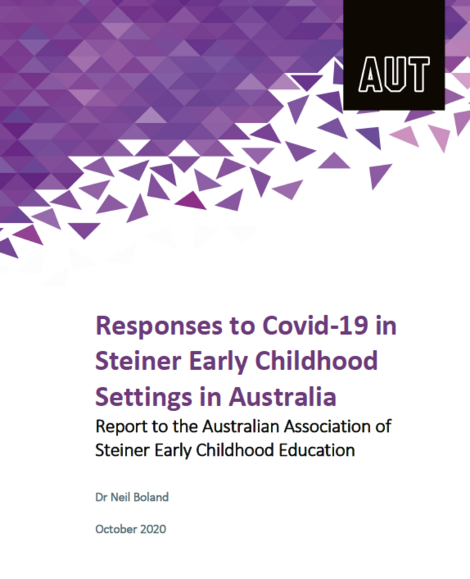The year 2020 has been dominated by the Covid-19 pandemic which has affected almost every country in the world and caused over a million deaths. Millions more have fallen into poverty; countless people have lost their jobs; schooling and education have been disrupted around the globe. Everyday activities which were taken for granted have been put on hold as countries have imposed differing levels of restriction on movement, on universities, schools and early childhood centres as well as on public and private gatherings. (1)
The Goetheanum has published information and articles on the coronavirus (2) and the Pedagogical Section hosts a blog containing advice for teachers on distance learning. (3) Waldorf Resources has also published articles connected to the change in delivery methods necessitated by the pandemic.
The restrictions imposed in response to the pandemic have had wide-ranging repercussions on educational institutions including in the early childhood sector. Australia and New Zealand have been less strongly affected by the pandemic than many countries, however there have still been significant consequences for those working in education.
Following the easing of a strict lockdown in New Zealand from March-May this year, I was talking to a group of early childhood colleagues. They were working through a set of questions sent by IASWECE (4) to national representatives to gather experiences of early childhood teachers during the pandemic. In conversation, it became clear that teachers had much else to say which was not being asked or recorded. It was important to me that every teacher had equal opportunity to have their voice heard. To facilitate this, I designed and ran two questionnaires in cooperation with Waekura, the Steiner early childhood body in New Zealand, which were sent to every early childhood teacher and teacher assistant in the country. One questionnaire asked simple, multiple-choice questions and the second asked for fuller, text-based replies. The same questionnaires were then run in Australia and a report compiled for each country (Australian report, New Zealand report).
Key findings from the New Zealand study include that the lockdown period was regarded as overwhelmingly positive for teachers as well as for children and parents (89% and 91%) – children benefitted from spending time at home with their families (who were also at home for the duration of the lockdown) and that the slower pace of life was enjoyed by many. There was some anxiety when children came back to centres, yet the overall picture has been one of resilience under difficult circumstances. Teachers altered daily schedules to accommodate children’s increased need to play freely and 97% of teachers reported that the parent/teacher relationship remained the same or improved over the lockdown period. Most were satisfied with how their centre had responded to Covid restrictions.
For Australian teachers, the increased quietness and reduction in stress and busyness was also seen as positive, however on the whole they did not experience lockdown as positive for teachers, children or their families (12% positive compared to 91% positive in New Zealand). This difference was unexpected. They reported that the situation highlighted families’ and communities’ need for social connection and support and for greater parent education. Nonetheless, once the lockdown periods were over and children were back in their centres, teachers reported themselves, their centres and the children to be significantly ‘back to normal’. Like New Zealand, the majority was satisfied with how their centre had responded to the challenges of the pandemic.
Given the significant and unexpected differences in responses to lockdown between these two groups of teachers in neighbouring countries, I wrote a comparison report which investigates possible causes of this (Comparison). One possibility is the nature of the governmental restrictions themselves. New Zealand’s response to the pandemic has recently been ranked as best in the world (5) with Australia’s ranked seventh. New Zealand’s initial lockdown was considerably stricter than those Australia has imposed at any stage. It might be expected that the strictness of this lockdown would be resisted, however it appears that it was the consequences of the strictness (quietness, families spending time together, reduction of stress) which led to it being seen as more positive. The less strict but longer lockdowns the Australian government has imposed at different times appear, paradoxically, to have been experienced as a greater burden. It would be interesting to investigate and record the experiences of Steiner early childhood teachers around the world to build a fuller picture of how this period has been experienced.
The reports are snapshots of a period of time which has already passed; the situation in both countries has moved on since the reports were written. The pandemic looks to be with us all for some time to come. It will undoubtedly continue to have financial, educational, individual and societal consequences which we can only guess at. I hope that there will be aspects of these reports which might help inform local or national planning and support and benefit Steiner early childhood education into the future.
Neil Boland is senior lecturer in the School of Education at Auckland University of Technology in New Zealand. His research interests include Steiner's indications on music for young children, the contextualisation of Steiner education in non-European cultural and geographic settings, and exploring first-person research methods. His work involves promoting the conversation between the Steiner education movement and other educational philosophies.
( 1) Oxford University Blavatnik School of Government. (2020). Coronavirus government response tracker. https://www.bsg.ox.ac.uk/research/research-projects/coronavirus-government-response-tracker#data
(2) Girke, M., & Soldner, G. (2020, March 19). Corona pandemic – aspects and perspectives. Medical Section at the Goetheanum. https://medsektion-goetheanum.org/fileadmin/user_upload/Corona-Pandemie__Aspekte_und_Perspektiven_EN.pdf
(3) Pedagogical Section at the Goetheanum. (2020). Distance Learning. https://www.goetheanum-paedagogik.ch/en/publications/blog-distance-learning
(4) International Association of Steiner Waldorf Early Childhood Education. iaswece.org/home/
(5) Chang, R., Hong, J., & Varley, K. (2020, November 24). The best and worst places to be in the coronavirus era. Bloomberg. Retrieved November 28 from https://www.bloomberg.com/graphics/covid-resilience-ranking/
